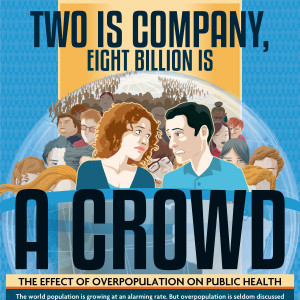The Effect of Overpopulation on Public Health
The world population is growing at an alarming rate. But overpopulation is seldom discussed as a public health issue. Just how many of us are there and how is our rising population affecting human health?
You Can’t Ignore the Facts
7,246,909,000
Current world population (1)
This number grows by the second.
296 billion
The world population that could be reached in 150 years if fertility remains consistent (2)
The population of Africa alone is expected to double around the mid-21st century (2)
76 million
The rate at which the population grows per year (2)
In the last 40 years, the population has doubled. (2)
World population by year (2)
Year: Population (in billions)
1804: 1
1927: 2
1959: 3
1974: 4
1987: 5
1999: 6
2011: 7
2023 (estimated) : 8
10 most populous countries (3)
China: 1,355,692,576
India: 1,236,344,631
United States: 318,892,103
Indonesia: 253,609,643
Brazil: 202,656,788
Pakistan: 196,174,380
Nigeria: 177,155,754
Bangladesh: 166,280,712
Russia: 142,470,272
Japan: 127,103,388
The Causes
Why such a huge increase in population in just the past 40 years alone? (4)
Decline in death rate (particularly infant mortality) (5)
The infant mortality rate in 1900 was 165 per 1,000 births. Today, that rate has lowered to 7.
Advanced medicine (6,7)
In 1900, the average life expectancy was a mere 48 years. But thanks to advances in modern medicine and nutrition education, today the average life expectancy in the U.S. is 78 years: a 30-year difference in just over a century.
Fertility treatment technology (7)
191,000 infants born in the U.S. in 2005 alone were conceived via fertility treatments. They accounted for 4.6% of births that year.
Lack of family planning (8)
Across the world, in developing countries, fewer than 1 in 5 women uses a form of family planning. With a lack of education about contraception, the population continues to boom.
The Effects
Overpopulation already affects most countries in the world. And if rates continue as they are, it’s about to get a lot worse. (4)
Food shortages/starvation (9)
Between 2010 and 2012, 1 in 8 people around the world was suffering from hunger and undernourishment.
Easily spread disease
The closer people become, the easier airborne illnesses are spread.
8.6 million
Tuberculosis cases in 2012 (10)
Water supply contamination (11)
3.4 million people die each year because of contaminated water related disease. Overpopulation will only create more polluted water supplies.
Disappearance of nonrenewable resources (12)
It is estimated that the earth’s supply of natural gas will run out in the next 35 years. It may happen sooner if the population rate continues to grow.
Desertification (13)
Currently, the health and livelihoods of nearly one billion people in 100 countries are threatened by the desertification of land. The hope for expanded agriculture could soon be gone.
Environmental damage
Beyond desertification, the general environment is very affected by overpopulation; with more people come more CO2 emissions. Climate change will be accelerated due to higher amounts of CO2 and methane in the atmosphere. (14, 15)
Climate change-related public health concerns:
- Heat waves
- Hurricanes
- Tsunamis
- Drought
- Air pollution
- Insects
- Contaminants
Unemployment (16)
The number of jobs available will never catch up with the population boom. In the last 60 years, the unemployment rate in the U.S. has risen from 2.5% to 6.1%.
Rising conflict between territories
Overpopulation will undoubtedly cause more wars regarding the ownership of land.
55,000
Conflict- or terrorism-related deaths every year (17)
Sources:
1. http://www.worldometers.info
2. http://www.overpopulation.org
3. https://www.cia.gov
4. http://www.conserve-energy-future.com
5. http://www.pbs.org
6. http://mappinghistory.uoregon.edu
7. http://www.cdc.gov
8. http://www.prb.org
9. http://www.worldhunger.org
10. http://www.who.int
11. http://water.org
12. http://greenliving.lovetoknow.com
13. http://www.ifad.org
14. http://www.biologicaldiversity.org
15. http://www.apha.org
16. http://www.tradingeconomics.com
17. http://www.genevadeclaration.org

